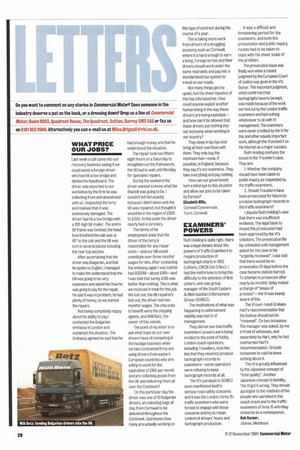EXAMINERS' POWERS Ruth Holding is quite right, there was a
Page 22

If you've noticed an error in this article please click here to report it so we can fix it.
legal debate about the powers of Traffic Examiners to require production of tachograph charts in 1992 (Letters, CM28 Oct-3 Nov). I had the misfortune to bring this difficulty to the attention of Bob Lintern, who was group manager of the South Eastern 84 Metropolitan Enforcement Group (SEMEG).
The implications of what was happening to enforcement viability was lost to VI management.
They did not see that traffic examiners' powers were being eroded to the point of futility. London coach operators, including Travellers, took the line that they need not produce tachograph records to examiners—some operators were refusing to keep tachograph records at all.
The VI's paralysis in SEMEG soon manifested itself in serious road safety concerns and it was the London (Area 15) traffic examiners who were forced to engage with those concerns and try to retain control of drivers' hours and tachograph production. It was a difficult and threatening period for the examiners, and both the prosecution and public inquiry routes had to be taken to cope with the sheer scale of the problem.
The prosecution issue was finally won when a recent judgment by the European Court of Justice was given in the VI's favour. This important judgment, which confirmed that tachographs have to be kept, was made because of the work carried out by the London traffic examiners and had nothing whatsoever to do with VI management. The examiners were never credited by the VI for this and other equally important work, although the VI posted it on the Internet as a major success.
Ruth Holding confuses the issues in the Travellers case. They are: 1. Whether the company should have been taken to public inquiry as requested by the traffic examiners.
2. Should Travellers have been prosecuted for failure to produce tachograph records to the traffic examiners?
I dispute Ruth Holding's view that there was insufficient evidence. The legal basis to mount this prosecution had been approved by the VI's solicitors. The prosecution file lay unheeded until management asked for the case to be "urgently reviewed". I was told that there would be no prosecution 10 days before the case became statute barred. To attempt to prosecute after nearly six months' delay invited a charge of "abuse of process"—the VI was keenly aware of this.
The VI over-ruled Graham Hart's recommendation that the licence should not be "renewed". On two occasions The manager was asked, by me in front of witnesses, and separately by Hart, why he had overturned Hart's recommendation. On both occasions he said he knew nothing about it.
The VI is greatly influenced by the Japanese concept of "total quality". Another Japanese concept is humility. The VI got it wrong. They should apologise to the relatives of the people who perished in this coach crash and to the traffic examiners of Area 15 who they smeared as a consequence. Bob Harper,
Staines, Middlesex.












































































































